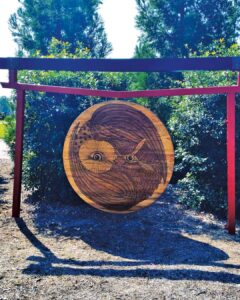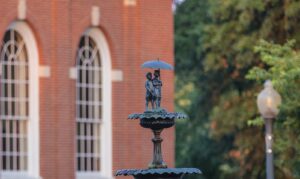January is the time when we attempt new fitness routines, new diets, new anything that could help us better our minds and bodies. Of course, this obsession with health and wellness is not a new fad. In fact, over 160 years ago, Aiken was known as a health resort and many sickly folks from across the nation came to stay in Aiken with the hope of regaining their vigor.
As early as the 1840s, Aiken hosted visitors from the southeastern coast as they sought refuge from coastal diseases in the summer months. And Aiken welcomed visitors from the northeast and the midwest who came to seek a warmer climate during the winter months. In an 1889 advertisement for Aiken, a pamphlet bragged that “No place on the continent has a better established reputation than Aiken. For more than fifty years the recuperative qualities of its dry, pure atmosphere, have been tried and tested by many thousands of invalids… Records, carefully kept by resident physicians, show that the percentage of those benefitted by a residence here is greater than at any of the best known resorts for pulmonary affections.”
A first hand account in the Augusta Chronicle on April 5, 1888 notes that “the climate [in Aiken] is salubrious and invigorating, and the inhaling of the odor of pine trees both pleasant and healthy… In short, for those persons afflicted with lung troubles, no place in the South would be more beneficial in the spring of the year than Aiken.” The abundance of pine trees was often mentioned in contemporary advertisements as a health benefit of Aiken’s environment. You may ask, what do pine trees have to do with lung diseases? Well, it has been medically proven that a chemical distilled from pine tree components acts to loosen phlegm from your lungs. So, although the piney air may have helped the sick feel better temporarily, there was no cure for pulmonary diseases such as tuberculosis in the Victorian era.
Another pamphlet joked that Aiken was a great town for invalids despite the fact that our town doctor’s name was Dr. Coffin; that the primary hostelry was operated by a Mrs. Groaning; and that the name of our town itself was Aiken. Coffin — Groaning — Aiken [Aching] — Get it? But the joke was on them because the attractiveness of Aiken’s climate led to the construction of a hotel for tuberculosis patients — a hotel that later opened to the general public — called the Highland Park Hotel. The hotel and its competitor hostelries brought visitors from across the nation, some of whom decided to buy property in the area. One such sickly person was a young girl name Louise Eustis who was brought to Aiken by her aunt Celestine Eustis. Through the promotional efforts of Celestine and her niece, who would become Louise Eustis Hitchcock, the wealthy equestrian set of New England began wintering in Aiken. Thus emerged the Winter Colony.
Now, just on the other side of the Aiken County line is the town of Blackville within Barnwell County. Residents of Aiken County have often traveled to the town’s healing springs for treatment of both minor and major ailments. The natural spring lies just three miles north of the small town of Blackville. Although rarely advertised, it is known the world over as “God’s Acre Healing Springs”.
Legend has it that while fighting in the Revolutionary War at the battle of Windy Hill Creek, there were four British soldiers who had been gravely wounded. Their regiment felt that these four were too badly injured to continue on, and so they were left behind with two older soldiers who were to watch after them and eventually bury them. Soon after the regiment departed, Native Americans happened upon the wounded men and led them to the healing springs. For 6 months the soldiers rested and convalesced and eventually made it back to their garrison in Charleston, citing the spring water as their medicinal cure. The site of the springs has been visited for hundreds of years by native peoples, and was eventually purchased by a trader and surveyor in the late 1700s. It passed through many owners until 1944, when L.P. Boyleston deeded the land in perpetuity to “Almighty God to be used by the sick and afflicted.”
With all of these healthy historic curiosities, we wish you the best in the new year! Stay curious!
Stay curious!
























